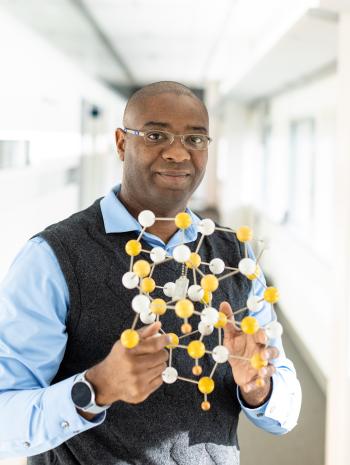
Valentino Cooper
Valentino “Tino” Cooper, a scientist at the Department of Energy’s Oak Ridge National Laboratory, has been appointed to DOE’s Basic Energy Sciences Advisory Committee for a three-year term. Cooper’s research elucidates the fundamental understanding of advanced materials for next-generation energy and information technologies.
The BESAC provides advice and recommendations on complex scientific, technical and programmatic issues relating to the Basic Energy Sciences program and reports to Asmeret Asefaw Berhe, director of the DOE Office of Science. Cooper will provide “expert advice in the field of condensed matter and materials physics and computational and theoretical sciences,” Berhe wrote when making the appointment earlier this month.
Cooper, a recipient of a DOE Early Career award in 2013 and a 15-year veteran at ORNL, is a Distinguished R&D Staff Member and head of the Materials Theory, Modeling and Simulation section in ORNL’s Materials Science and Technology Division. He also is director of a DOE Energy Frontier Research Center called Fast and Cooperative Ion Transport in Polymer Electrolytes, or FaCT.
“I am truly honored to have been selected to participate as a member of the BESAC,” Cooper said. “I am looking forward to advising BES as it sets long-range plans, priorities and strategies to facilitate science that addresses our nation’s energy challenges.”
Cooper joins the BESAC as ORNL scientist Andrew Stack, leader of the Geochemistry and Interfacial Sciences group in ORNL’s Chemical Sciences Division, cycles off the committee. Stack had served on the BESAC since 2019.
Stack said his tenure on the BESAC was meaningful. “I used my voice to help ensure that BES’s strategy focused on synchrotrons and that scientific research computing was sound,” he said. “Over my three years of service, my biggest accomplishment was chairing the Committee of Visitors for the Chemical Sciences, Geosciences and Biosciences division of BES. This committee serves to assess the proposal review process at BES, ‘reviewing the reviewers,’ so to speak, and to recommend changes.”
Cooper received his doctorate in chemistry from the University of Pennsylvania in 2005. Before joining ORNL in 2008, he was a postdoctoral associate in physics at Rutgers University. From 2017 to 2020, he was an associate editor of the Journal of Applied Physics. Cooper, who grew up in the Bahamas, received his undergraduate degree in chemistry from Vassar College.
Cooper’s research focuses on electronic structure methods for understanding dispersion interactions among molecules and in the prediction of functional materials, including piezoelectrics and ferroelectrics. He works to develop advanced theoretical and computational tools to predict what materials can be synthesized for a variety of uses.
BESAC’s recommendations include advice on establishing research and facilities priorities; determining proper program balance among disciplines; and identifying opportunities for interlaboratory collaboration, program integration and industrial participation. Its 32 members come from universities, national laboratories and industries involved in energy-related scientific research.
BES is a program office within DOE’s Office of Science. The program supports basic scientific research to lay the foundations for new energy technologies and to advance DOE missions in energy, environment and national security. BES research emphasizes discovery, design and understanding of new materials and new chemical, biochemical and geological processes. It oversees several user facilities, including the Center for Nanophase Materials Sciences, the Spallation Neutron Source and the High Flux Isotope Reactor, all located at ORNL.
“BES-funded research seeks to better understand the physical world and harness nature to benefit people and society,” said Cynthia Jenks, ORNL associate laboratory director for the Physical Sciences Directorate. “We are extremely proud that Tino will advise one of the nation’s largest sponsors of research in the physical sciences. It is testament to his scholarship and research excellence.”
source: Lawrence Bernard, science writer, Oak Ridge National Laboratory



